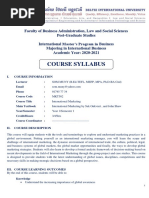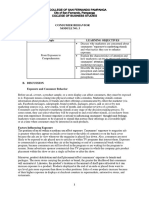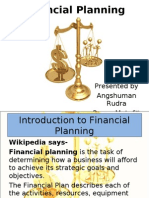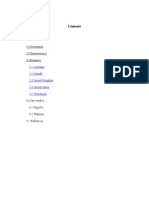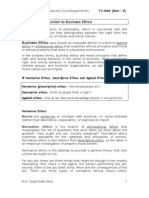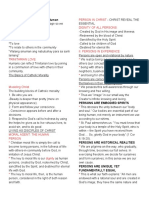100%(1)100% found this document useful (1 vote)
120 viewsBasic Microeconomics Notes
Microeconomics deals with individual decision-making and resource allocation on a small scale. It examines how individuals, households, and firms make choices about production, consumption, and exchange to maximize benefits given scarce resources and considers costs and trade-offs of decisions. Macroeconomics looks at an overall economy, analyzing unemployment, inflation, GDP, and other aggregate indicators. Markets are generally efficient at allocating resources, though government intervention is sometimes needed to improve outcomes or enforce necessary regulations and institutions.
Uploaded by
Rose Anne BautistaCopyright
© © All Rights Reserved
Available Formats
Download as DOCX, PDF, TXT or read online on Scribd
100%(1)100% found this document useful (1 vote)
120 viewsBasic Microeconomics Notes
Microeconomics deals with individual decision-making and resource allocation on a small scale. It examines how individuals, households, and firms make choices about production, consumption, and exchange to maximize benefits given scarce resources and considers costs and trade-offs of decisions. Macroeconomics looks at an overall economy, analyzing unemployment, inflation, GDP, and other aggregate indicators. Markets are generally efficient at allocating resources, though government intervention is sometimes needed to improve outcomes or enforce necessary regulations and institutions.
Uploaded by
Rose Anne BautistaCopyright
© © All Rights Reserved
Available Formats
Download as DOCX, PDF, TXT or read online on Scribd
You are on page 1/ 4
Microeconomics -we should weigh advantages and
- making choices/decisions. disadvantages.
- satisfaction of needs. -when you do or performe a decision-making
- scarcity. you try to come up with the most benefits.
- major issues in this subject is the resources The benefits should up weigh a cost.
to satisfy our needs is very scarce. It can reach Trade-off
in extinction. -something you don’t want, but agree to
The difference of Micro to Macro accept so you can get something you do want.
Micro Ex. A trade-off of getting a big truck is you
- talking about individuals learning, simple have to spend more on gas.
company, simple corporation. - A trade-off of staying up late to play video
Macro games is you get less sleep.
- dealing with global organizations. Ex: - A trade-off of building a new community on
Microsoft, apple or Toyota. wetlands is destroying animal habitat.
Microeconomics Efficiency
- Individuals market - the capacity of society getting the most it
- Effect on price of a good can from its scarce resources.
- Individual labour market Equality
- Individual consumer behavior - society’s ability of distributing economic
- Supply of good prosperity uniformly among the members of
Macroeconomics society.
- Whole economy (GDP)
- Inflation (general price level) * The world was created with resources
- Employment/unemployment ENOUGH for everybody!
- Aggregate demand (AD) - Acknowledging trade-offs is equal to
- Productive capacity of economy making GOOD DECISIONS.
oikonomos Principle 2: The cost of something is what you
- one who manages a household. give up to get it.
* As early as time, man’s instincts guided him Opportunity cost
to survive. - Whatever must be given up to obtain some
What job will be done and who will do them item.
- Electricians, factory workers, skilled works, - It’s like trade-off if we go one way there is a
carpenter, doctors, nurse etc. possibility that the other way be a lot better or
Scarcity you have made the wrong turn of choice.
- The limited nature of society’s resources. Principle 3: Rational people think at the
- root word scarce. margin
Economics Rational People
- the study of how society manages its scarce - people who systematically and purposefully
resources. do the best they can to achieve their
10 Principles of Economics objectives.
a. How people make decisions Marginal change
b. How people interact - a small incremental adjustment to a plan of
c. How the economy as a whole works action.
a. How people make decisions Principle 4: People respond to incentives
Principle 1: People Face trade-offs Incentives
Cost-Benefits Analysis - Something that induces a person to act.
Ex. In Europe as gas prices soar, buyers are - He simply observing the behavior of people.
switching to smaller cars. - He also create theories.
b. How people interact Characteristics of a free-market; the invisible
Principle 5: Trade can make everyone better hand principle
off. - According to the invisible hand theory, each
- Trading may mean the simplest barker of us, acting in our own self-interests,
system during the early times. Trade may generates a demand for goods and services
mean buying and selling when money was that compels others to deliver most efficient
invented. Money developed in use it was manner so that they may be able to receive
called buying and selling. compensation from others and make a profit
- Present times, trading is included in a lot of in doing so. In this process, resources are
commercial transactions specifically in allocated in the most efficient manner, in
businesses. Trading of ideas can also be given contrast to a process that relies on a centrally
in example because in trading everyone can planned system.
make better off. Self-interest - it’s all about your willingness to
- Trade allows each person to specialize in the perform something for the good of your
activities he/she does best. welfare.
- By trading, people can buy a greater variety Ex: ang jeepney driver kapag gumigising sa
of goods and services at lower cost. umaga ang unang naiisip ay lalabas sya ng
Principle 6: Markets are usually a good way to maaga para makarami syang makuhang
organiza economic activity. pasahero at madaming maiuwi na pera sa
Difference between communism and Market bahay nila.
economy * Households and firms interacting in markets
Communism - all are owned by the act as if they are guided by an invisible hand
government. that leads them to desirable market outcomes.
- everything is being operated and controlled c. How the economy as a whole works
by the government, because of the idea of Principle 7: Government can sometimes
socialism, improve market outcomes
- giving priority to society over the individual. - The government enforces policies and
- Under communism you cannot owned any regulations to maintain order, aside from
property because everything is being owned peace, aside from order we have to maintain
by the states. certain level of business decorum, ethical
Market economy – is all about constitutional business operations, disciplined.
democracy. People enjoying their rights and - Regulations (DTI, SEC)
privileges as free individuals. Example of agencies:
Ex: Here in the Philippines if you want to Department of Trade and Industry
have a business you need to register your Security and Exchange Commission
business in Security and Exchange - Taxation –people will give whatever tax is
Commission (SEC). Your business name is due in the government.
legitimately registered under the requirement - Taxes use to finance public activities and
set by the local government. effort to continuously maintain proper
Market economy – an economy that allocates operations of society.
resources through the decentralized decisions - Local Government Units (LGU) Support –
of many firms and households as they interact government needs the help of LGU for
in markets for goods and services. support in order to implement properly the
Adam Smith – Father of Economics.
rules and regulations or to maintain smooth All productive activities are privately
harmoniously economic activities. owned.
* The invisible hand can work its magic only Goods & services produced are not
if the government enforces the rules and planned by anyone.
maintains the institutions that are key to a Production is determined by the interaction
market economy. of supply & demand and signaled through
* The government is responsible in enforcing the price system.
property rights so individuals can own and Supply must not be restricted (no
control scarce resources. monopoly)
- Property rights Encourage free and fair competition
- Private property rights between private producers.
- Real vs. personal property Outlawing monopolies &restrictive
Principle 8: A country’s standard of living business practices.
depend on its ability to produce goods and
Private ownership ensures that
services.
entrepreneurs have the right to the profits
Standard of Living – It is the idea where in
generated by their own efforts.
individuals are improving their lifestyle
Gives entrepreneurs the incentive to search
brought about by their capacity to earn.
for better ways of serving consumer needs.
Principle 9: Prices rise when the government
Command economy
prints too much money
Ex: In the Philippines during the Christmas The goods and services that a country
season, people are spending a little more than produces, the quantity in which they are
the usual, we have a tradition of gift giving, produced, and the prices at which they are
feast so the purchases during Christmas sold are all planned by the government.
season is increasing. There is a tradition of State owned
Christmas bonus or 13th month pay. The government can then direct
Inflation – an increase in the overall level of investments that are in best interest of the
prices in the economy. nation as a whole rather than the interest of
Principle 10: Society faces a short-run trade- private individuals.
off between inflation and unemployment less or no incentive to find ways to serve
Relationship of inflation to unemployment – if customers therefore dynamism and
the rate of unemployment is increase meaning innovation are absent.
if many are unemployed what will happen to Mixed economy
their capacity to buy their capacity to buy will certain sectors are left to private ownership
be reduced because many are unemployed, if and free market mechanism while other
the capacity to buy is low the demand is sectors have significant state ownedrship
decrease because people have no money so and government planning.
that the supply is higher than the demand. Property Rights
Business Cycle – fluctuations in economic the ability of an individual to own and
activity, such as employment and production. exercise control over scarce resources
Ex. the Pandemic has great impact to all the
business. And also the politics because of Private Property Rights
their rules and regulations of government. a. The right to exclusive use of the property
Economic System (Possession, control, and use)including the
Market Economy right to exclude others
b. Legal protection against invasion from
other individuals who would seek to use or
abuse the property without the owner’s
permission
c. The right to transfer, sell, exchange, or
mortgage the property
INCENTIVE EFFECTS OF PRIVATE
OWNERSHIP
1. Private owners can gain by employing
their resources in ways that are beneficial
to others.
2. Private owners have a strong incentive to
care for and properly manage what they
own.
3. Private owners have an incentive to
conserve for the future
4. Private owners have an incentive to lower
the chance that their property will cause
damage to the property of others.
2 Broad Reasons for the Government to
interfere:
Promote efficiency
Promote equality
Market Failure
A situation in which a market, left on its
own, fails to allocate resources efficiently
Externality
The impact of one person’s actions on the
well-being of others
Market Power
The ability of a single economic player to
have a substantial influence on market
prices
A market economy rewards people according
to their ability to produce things that other
people are willing to pay for.
You might also like
- (Davey) Entry and Exit Confessions of A Champion Trader 52 Ways86% (7)(Davey) Entry and Exit Confessions of A Champion Trader 52 Ways214 pages
- Dr. Fabian Mpuku - Effectiveness of Monetary Policy On Inflation in Zambia, 17th August 2017No ratings yetDr. Fabian Mpuku - Effectiveness of Monetary Policy On Inflation in Zambia, 17th August 201768 pages
- A Level Economics Assignment - Profits and Profit MaximisationNo ratings yetA Level Economics Assignment - Profits and Profit Maximisation3 pages
- Unit 2 - Demand, Supply, and Market Equilibrium100% (1)Unit 2 - Demand, Supply, and Market Equilibrium65 pages
- After Reading This Lesson You Should Be Able To:: Module 2: Retail CustomerNo ratings yetAfter Reading This Lesson You Should Be Able To:: Module 2: Retail Customer9 pages
- CASE STUDY 1 (Strategic Marketing Management) Mirela FashionsNo ratings yetCASE STUDY 1 (Strategic Marketing Management) Mirela Fashions1 page
- Differences Between Micro and Macroeconomics100% (1)Differences Between Micro and Macroeconomics5 pages
- Economic Factors Affecting Business Environment100% (1)Economic Factors Affecting Business Environment17 pages
- CBSE Class 12 Syllabus For Economics 2014-2015No ratings yetCBSE Class 12 Syllabus For Economics 2014-20154 pages
- Environmental Scanning and Industry Analysis ReportNo ratings yetEnvironmental Scanning and Industry Analysis Report59 pages
- Class 1 - Principles of Economics (1introduction)100% (8)Class 1 - Principles of Economics (1introduction)34 pages
- Applied Economics: Economics As A Social Science and As Applied ScienceNo ratings yetApplied Economics: Economics As A Social Science and As Applied Science6 pages
- Caca&Caillo - Developing Products For The Foreign Market Entry Strategies0% (1)Caca&Caillo - Developing Products For The Foreign Market Entry Strategies18 pages
- Utilising Tax Literacy and Societal ConfNo ratings yetUtilising Tax Literacy and Societal Conf19 pages
- Chapter 1: Ten Principles of Microeconomics: Economy Households and EconomiesNo ratings yetChapter 1: Ten Principles of Microeconomics: Economy Households and Economies3 pages
- Chapter 1: The Gift of Being Human: Person in Christ Dignity of All PersonsNo ratings yetChapter 1: The Gift of Being Human: Person in Christ Dignity of All Persons3 pages
- The Government's Response To Help The People During The Quarantine (ECQ)No ratings yetThe Government's Response To Help The People During The Quarantine (ECQ)1 page
- O o 3 Branches of The Government o - o o 2 Parts of Law 1No ratings yetO o 3 Branches of The Government o - o o 2 Parts of Law 110 pages
- Declamation Piece. Bautista, Rose Anne P.No ratings yetDeclamation Piece. Bautista, Rose Anne P.1 page
- ab0QoobySU29EKKG8vlNug - ACCY 506 Module 1 TranscriptNo ratings yetab0QoobySU29EKKG8vlNug - ACCY 506 Module 1 Transcript39 pages
- Ch. 5 Monetary Policy and Central BankingNo ratings yetCh. 5 Monetary Policy and Central Banking16 pages
- Sales Analysis of E-Commerce Websites Using Data MNo ratings yetSales Analysis of E-Commerce Websites Using Data M6 pages
- Marketing Canadian 4th Edition Grewal Test Bank100% (22)Marketing Canadian 4th Edition Grewal Test Bank38 pages
- St. Vincent College: Tuition Fee Per Unit at P400 Miscellaneous Fees100% (1)St. Vincent College: Tuition Fee Per Unit at P400 Miscellaneous Fees3 pages
- Insentif Pajak, Kepemilikan, Dan Penghindaran Pajak PerusahaanNo ratings yetInsentif Pajak, Kepemilikan, Dan Penghindaran Pajak Perusahaan38 pages
- Candlestick Technical Analysis On Select Indian Stocks: Pattern Detection and Efficiency StatisticsNo ratings yetCandlestick Technical Analysis On Select Indian Stocks: Pattern Detection and Efficiency Statistics4 pages
- Ownership Structure, Corporate Governance and Corporate Liquidity Policy EvidenceNo ratings yetOwnership Structure, Corporate Governance and Corporate Liquidity Policy Evidence20 pages
- Create This Together With The Person Funding This Project.: Business Objective and ContextNo ratings yetCreate This Together With The Person Funding This Project.: Business Objective and Context23 pages
- F - 307 Term Paper On Idea Generation & Develop A Business PlanNo ratings yetF - 307 Term Paper On Idea Generation & Develop A Business Plan36 pages
- (Davey) Entry and Exit Confessions of A Champion Trader 52 Ways(Davey) Entry and Exit Confessions of A Champion Trader 52 Ways
- Dr. Fabian Mpuku - Effectiveness of Monetary Policy On Inflation in Zambia, 17th August 2017Dr. Fabian Mpuku - Effectiveness of Monetary Policy On Inflation in Zambia, 17th August 2017
- A Level Economics Assignment - Profits and Profit MaximisationA Level Economics Assignment - Profits and Profit Maximisation
- After Reading This Lesson You Should Be Able To:: Module 2: Retail CustomerAfter Reading This Lesson You Should Be Able To:: Module 2: Retail Customer
- CASE STUDY 1 (Strategic Marketing Management) Mirela FashionsCASE STUDY 1 (Strategic Marketing Management) Mirela Fashions
- Environmental Scanning and Industry Analysis ReportEnvironmental Scanning and Industry Analysis Report
- Applied Economics: Economics As A Social Science and As Applied ScienceApplied Economics: Economics As A Social Science and As Applied Science
- Caca&Caillo - Developing Products For The Foreign Market Entry StrategiesCaca&Caillo - Developing Products For The Foreign Market Entry Strategies
- Chapter 1: Ten Principles of Microeconomics: Economy Households and EconomiesChapter 1: Ten Principles of Microeconomics: Economy Households and Economies
- Chapter 1: The Gift of Being Human: Person in Christ Dignity of All PersonsChapter 1: The Gift of Being Human: Person in Christ Dignity of All Persons
- The Government's Response To Help The People During The Quarantine (ECQ)The Government's Response To Help The People During The Quarantine (ECQ)
- O o 3 Branches of The Government o - o o 2 Parts of Law 1O o 3 Branches of The Government o - o o 2 Parts of Law 1
- ab0QoobySU29EKKG8vlNug - ACCY 506 Module 1 Transcriptab0QoobySU29EKKG8vlNug - ACCY 506 Module 1 Transcript
- Sales Analysis of E-Commerce Websites Using Data MSales Analysis of E-Commerce Websites Using Data M
- St. Vincent College: Tuition Fee Per Unit at P400 Miscellaneous FeesSt. Vincent College: Tuition Fee Per Unit at P400 Miscellaneous Fees
- Insentif Pajak, Kepemilikan, Dan Penghindaran Pajak PerusahaanInsentif Pajak, Kepemilikan, Dan Penghindaran Pajak Perusahaan
- Candlestick Technical Analysis On Select Indian Stocks: Pattern Detection and Efficiency StatisticsCandlestick Technical Analysis On Select Indian Stocks: Pattern Detection and Efficiency Statistics
- Ownership Structure, Corporate Governance and Corporate Liquidity Policy EvidenceOwnership Structure, Corporate Governance and Corporate Liquidity Policy Evidence
- Create This Together With The Person Funding This Project.: Business Objective and ContextCreate This Together With The Person Funding This Project.: Business Objective and Context
- F - 307 Term Paper On Idea Generation & Develop A Business PlanF - 307 Term Paper On Idea Generation & Develop A Business Plan





